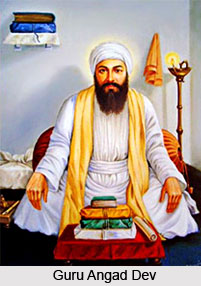 Guru Angad Dev is considered to be the second Sikh religious leader. He was the son of a prosperous Hindu trader, Bhai Pheru. Born in a village called Harike in Ferozepur district of the Punjab on March 31, 1504, this sikh guru was also known as Bhai Lehna. Guru Angad Dev is renowned for inventing the present form of the Gurmukhi script. He introduced the idea of equality of man and the principle became fundamental to the Sikh spiritual system.
Guru Angad Dev is considered to be the second Sikh religious leader. He was the son of a prosperous Hindu trader, Bhai Pheru. Born in a village called Harike in Ferozepur district of the Punjab on March 31, 1504, this sikh guru was also known as Bhai Lehna. Guru Angad Dev is renowned for inventing the present form of the Gurmukhi script. He introduced the idea of equality of man and the principle became fundamental to the Sikh spiritual system.
Since his childhood Bhai Lehna was known to be an ardent devotee of the Hindu goddess, Durga. He used to organise yearly pilgrimage for Hindus to a Durga temple in the lower Himalayas, Jawalamukhi. During such visits he met Bhai Jodha, a Sikh Guru, whose recitation of Japji and Asa di Var influenced Bhai Lehna spiritually. In addition to that Bhai Lehna learnt about Guru Nanak from Bhai Jodha.
The Divine Sabad recited by Bhai Jodha and composed by Guru Nanak made such an impact on Bhai Lehna`s mind that he became eager to meet the Guru. Thus, he met Guru Nanak and offered his obeisance. Eventually, Lehna became a devout disciple of Guru Nanak and renounced his former practices. Guru Nanak instructed Lehna to return to his homeland and preach to the people the ways of Sikhism. On Guru Nanak`s instruction Lehna spent most of his time in prayer and serving the people. His contribution towards the society was impeccable. He distributed food to the poor and worked for the betterment of the Sikh community. In later years, Bhai Lehna went to stay with Guru Nanak and became totally devoted to the service of the Guru.
Thus satisfied with Lehna`s spiritual development, Guru Nanak eventually appointed him as his successor on July 14, 1539 renaming him as Guru Angad. After Guru Nanak`s death, Guru Angad returned to Khadur where he went into seclusion and meditation for six months. Guru Angad can be termed as the embodiment of humility. He followed a routine that Guru Nanak had. His days started early at dawn and continued with the recitation of Guru Nanak`s Japji (Morning Prayer) and sang Asa di var with his congregation. He worked during the daytime and then organised evening prayers. Guru Angad also maintained langar where people of all religions and casts could gather for a free meal. He took keen interests in physical fitness, and encouraged his devotees to get involved in sports as well.
Guru Angad was known to be fond of children. He took a great interest in their education. He advocated that they should be taught to read and write in their mother tongue, Punjabi. Being the successor of Guru Nanak he also got the first authorized biography of Guru Nanak written in 1544. Guru Angad further expanded the number of Sikh religious centres.




















